#rep. Peter DeFazio
Text
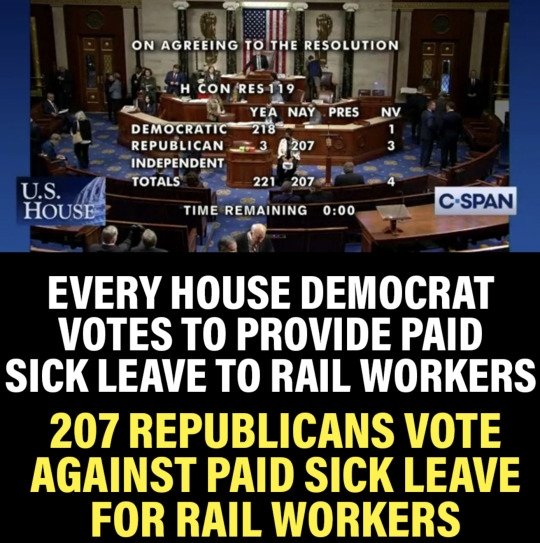
After monthslong fears of a national railroad strike, Congress voted Wednesday to force an end to negotiations between the railroads and their unions with a pair of bills designed to draw concessions from both sides.
One bill (which passed with 79 Republican votes and 211 Democratic ones) codified the higher wages the railroads were offering. Members of Congress also voted to implement mandatory sick time as part of the deal, a nod to worker demands for more paid time off that railroads were unwilling to relent on.
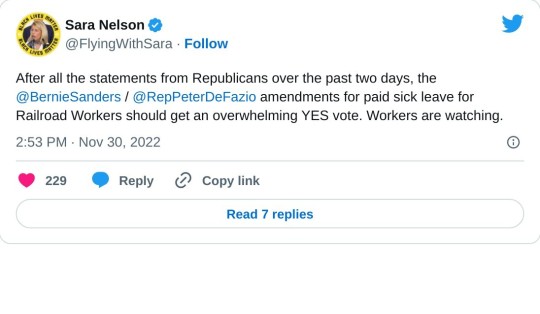
That successful amendment, sponsored by Democratic Representative Peter DeFazio and independent Senator Bernie Sanders, came on the heels of bipartisan criticism of President Joe Biden's support of a deal without concessions for paid time off, a deal-breaker that earned scorn from progressives like Alexandria Ocasio-Cortez alongside conservatives like Missouri Senator Josh Hawley.
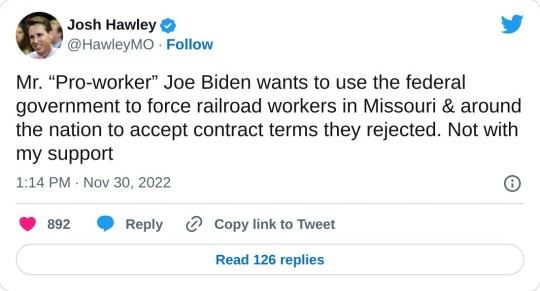
Florida Senator Marco Rubio tweeted Tuesday he "will not vote to impose a deal that doesn't have the support of the rail workers."
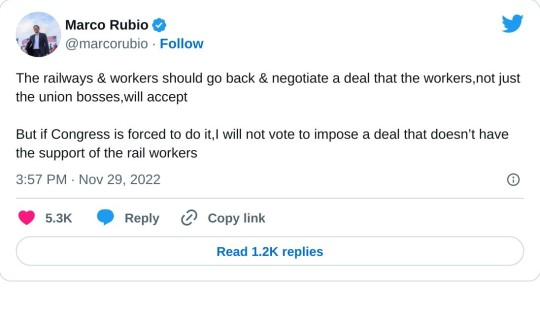
Ultimately, all but three Republican members of Congress—who, notably, have unlimited sick days and all 10 federal holidays off per year—still voted against it.
Internally, the result was largely expected. House Minority Leader Kevin McCarthy indicated to reporters prior to the vote few Republican members were expected to vote in favor of increasing paid time off.

But outwardly, it's not clear why: So far, no Republicans have offered a public rationale for rejecting the deal, nor is it clear whether they opposed the concept of sick time or congressional intervention in railroad workers' efforts to negotiate the deal for themselves.
In early negotiations, the unions requested 15 days of sick leave, while the resolution adopted Wednesday notably had just seven. Numerous Democrats also voted against the larger bill to avert the strike, calling the compromise a betrayal of workers' desire to negotiate a contract on their terms.
However, the fact no Democrats voted against the sick time provision signaled to some that Republicans were voting to prevent workers from obtaining benefits they themselves have: namely, the ability to take time off work whenever they feel the need.
In an earlier vote in the Senate this year, North Carolina Republican Richard Burr and Mississippi Republican Roger Wicker introduced a resolution intended to resolve the strike that did not include provisions for sick leave, earning scorn from Sanders in a speech on the Senate floor. (The resolution failed.)
The disparity between railroaders and members of Congress was visibly on display on social media after the vote.
Notably, a Politifact examination of a Facebook post several years ago alleging similar claims determined there is no limit on sick days or time off for members of Congress, while a Bureau of Labor Statistics report from 2020 found the average private industry worker received an average of eight paid holidays, seven paid sick leave days and 11 paid vacation days per year after one year of work.
And while railroaders get anywhere between three to four weeks of paid vacation and over 10 personal leave days per year, many do not have the flexibility to use them the way people in other industries—like Congress—typically do.
"The 'working class party' strikes again," Justin Baragona, a media reporter for the Daily Beast, tweeted following the vote.
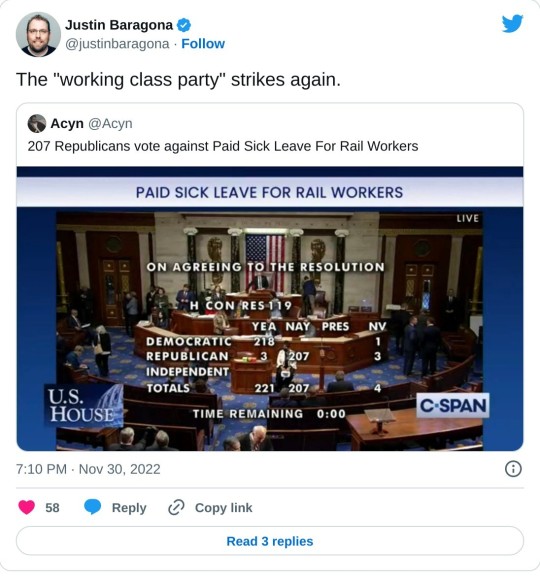
#us politics#2022#twitter#tweet#republicans#conservatives#gop#paid sick leave#railway workers#railroad unions#railroad strike#railroads#working class#worker's rights#worker's union#pro union#union workers#newsweek#rep. Peter DeFazio#sen. bernie sanders#sara nelson#sen. josh hawley#sen. marco rubio#jake sherman#rep. kevin mccarthy#Justin Baragona#sen. richard burr#sen. Roger Wicker
48 notes
·
View notes
Text
How Democrats could win more elections

My fellow Americans…if I may call you that? I’ve only been a US citizen for five weeks, but I think I may have identified a key weakness in the Democrats’ electioneering strategy, and I wanted to bring it to your attention because it would be great if the forced birth/martial law/mass incarceration party didn’t win the next election.
If Democrats want to win more elections, they should try:
Enacting popular policies, preferably ones that materially improve the lives of potential voters;
Making sure those policies take effect before the next election; and
Telling people about them.
As a bonus, they could also publicize when Republicans want to enact policies that:
Aren’t popular; and
Materially worsen the lives of potential voters.
I know, I know. Don’t teach granny to suck eggs! High-paid Democratic Party consultants have forgotten more about this stuff that I’ll ever learn, etc etc. But you guys, I think I could really be onto something.
Take Social Security. Created in 1935 by FDR, Social Security is one of the most popular government programs in US history — and it’s especially popular among old people for some reason, and you know, old people vote a lot!
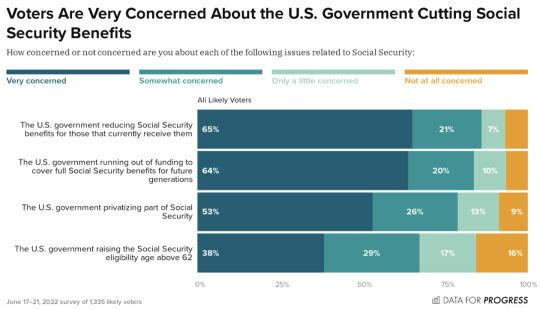
[Image ID: A Data for Progress polling data chart entitled ‘Voters Are Very Concerned About the US Government Cutting Social Security Benefits.]
80% of US voters want Social Security expanded. Not 80% of Democrats — 80% of voters, from a June 2022 survey from Data For Progress:
https://www.filesforprogress.org/datasets/2022/6/dfp_ss_june_tabs.pdf
And yet, a July poll found that 70% of voters hadn’t heard that the GOP wants to “sunset” Social Security — that is, get rid of it, over the next five years. 71% of Republicans didn’t know this — and neither did 76% of independents (who might, you know, vote Democrat if they found out), nor did 64% of Democrats.
https://www.filesforprogress.org/datasets/2022/7/dfp_july_ss_tabs.pdf
This is just me spitballing here, but what if someone like Nancy Pelosi or Joe Biden or Chuck Schumer were to call a press conference and announce that this was the Republicans’ plan? I mean, it’s a long shot, but maybe if they were to tell voters what specific, material, important changes the next election could bring about, voters would find that interesting or even motivating.
I know, I know, I’m not an expert here. But when 81% of all likely voters support indexing Social Security to the cost of living, Democrats could actually do that, and also point out that Republicans won’t?
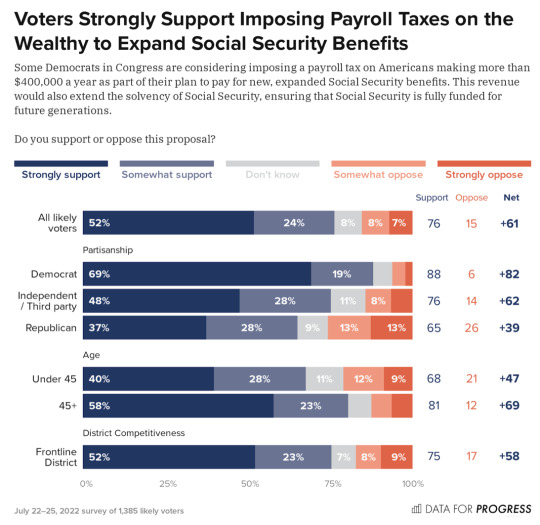
[Image ID: A Data For Progress chart entitled ‘Voters Strongly Support Imposing Payroll Taxes on the Wealthy to Expand Social Security Benefits.’]
And while pay-fors are bullshit (the US Treasury is a currency issuer, not a currency user, and it is not monetarily constrained), if the Dems wanted to do pay-fors to fund Social Security expansion, they could tax the rich. 76% of Americans want higher taxes on people earning $400k or more/year, including 76% of independents and 65% of Republicans.
As Jessica Corbett writes for Common Dreams, the Congressional Progressive Caucus is onto this, and is spreading the word, primarily via CPC chair Rep. Pramila Jayapal, but the Democratic party leadership is effectively silent on subject:
https://www.commondreams.org/news/2022/08/15/80-us-voters-across-party-lines-support-expanding-social-security
This despite the fact that there is already proposed legislation to enact this extremely popular policy that would hearten Democrats, please independents, and demonstrate to the majority of Republican voters which party has their interests at heart.
Social Security 2100: A Sacred Trust is a bill introduced by Rep John Larson, intended to end the 50 year neglect of Social Security:
https://larson.house.gov/issues/social-security-2100-sacred-trust
And then there’s the Social Security Expansion Act, introduced by Bernie Sanders and Rep Peter DeFazio, which increases contributions by the wealthy and expands benefits to match increases in the cost of living:
https://www.commondreams.org/news/2022/06/09/time-scrap-cap-sanders-warren-bill-targets-rich-expand-social-security
But the Dem leadership isn’t pushing for these bills and they’re keeping the GOP’s intention to zero out Social Security very quiet. It’s hard to say why, but maybe it has to do with the corporate wing of the party’s hatred of Social Security, which has found its expression in Biden’s nomination of the anti-Social Security ideologue Andrew Biggs the Social Security Advisory Board:
https://www.levernews.com/biden-taps-anti-social-security-ideologue-to-oversee-program/
Biggs has spent his career advocating for Social Security cuts and privatization — two ideas that are both cruel and wildly unpopular, especially among old people, who, as noted, vote a lot. Biggs is a fellow at the American Enterprise Institute, an organization whose illustrious career includes a key role in denying climate change and promoting the interests of tobacco companies:
https://www.theguardian.com/world/ng-interactive/2019/jan/23/free-market-thinktanks-tobacco-control-polices-database#0/?american-enterprise-institute
Biggs says he no longer favors privatizing Social Security — he’s switched to another boondoggle, creating investment accounts for Social Security savers that would let them give their retirement savings to Wall Street to gamble with.
As Matthew Cunningham-Cook writes for The Lever, Biggs’s career includes work on GW Bush’s plan to privatize Social Security and shift its investments from T-bills to “high-fee, high-risk ‘personal accounts.’”
https://www.levernews.com/biden-taps-anti-social-security-ideologue-to-oversee-program/
This wasn’t a temporary lapse: Biggs has spent his career writing editorials and papers calling for Social Security cuts and privatization, claiming, for example, that Social Security privatization would make seniors “not only richer, but also happier, healthier, more familial, smarter, and more active citizens.”
https://www.cato.org/commentary/investings-rich-fringe-benefits
Biggs’s career is a Zelig-like tour of catastrophic privatizations and cuts — for example, in 2016, he became part of the unaccountable board that seized control over Puerto Rico, sidelining its elected leaders with the mission to make sure that Puerto Rico kept paying out to Wall Street bond-holders, irrespective of the human costs:
https://www.aei.org/profile/andrew-g-biggs/
Not only are Biggs’s ideas terrible — they are also wildly, fantastically unpopular among voters. Voters do not want this. Social Security privatization is the pet project of a minuscule minority of fantastically wealthy dilettantes, and if it come to pass, the party responsible for them will be deservedly punished in elections.
Now, the Democrats are, in fact, capable of creating policy that is both popular among voters and the sort of thing that will make material improvements to their lives. For example, the Inflation Reduction Act contains modest, but meaningful, controls on pharmaceutical prices.
Here too, however, the Democrats have managed to absolutely snatch defeat from the jaws of victory. The drug price controls in the IRA don’t take effect until 2026 — that is, long after the next two elections.
Writing in The American Prospect, David Ddayen points out that while negotiating prices takes some time, this is an outrageously, pointlessly, self-defeatingly long timeline. Medicare itself was implemented in a single year:
https://prospect.org/health/prescription-drug-price-reforms-wont-happen-for-years/
And at least some parts of the drug price controls could go into effect tomorrow — but are still not going to be implemented until long after the next two elections. The $2000 cap on seniors’ annual out-of-pocket drug spending doesn’t go into effect until 2025.
Again, I’m just a humble Canadian, newly welcomed into America’s bosom, but it seems to me that if you want to win an election, you should do things to make life better for voters before that election rolls around. Implementing the out-of-pocket cap requires “tallying up patient out-of-pocket costs, which are fully transparent, until they hit $2,000, and then stopping them.”
What’s more, as Dayen points out, delaying the Medicare pharma price negotiations actually makes this bill cost more — every dollar that is negotiated down in pharma pricing is a dollar that can be used to offset the out-of-pocket cap (though again, offsets are bullshit).
The Dems are planning to run on these price caps for the midterms, but, as Dayen says, Dems are going to be claiming to have fixed something that is still broken, as in, “Vote for me — I fixed something for you four years from now!”
Dems gain nothing by this delay. Pharma-backed dark money groups are already blitzing out ads that lie shamelessly about the Medicare improvements in the bill, claiming that Dems have “cut Medicare by $300m” (meaning that Dems have told pharma they’re going to cram $300m in savings down their shareholders’ throats and use that money to help patients):
https://pluralistic.net/2022/08/11/rope-a-dope/#cowards-and-lies
I realize that I am not a high-paid Democratic Party consultant here, but I remain convinced that the party could improve its election prospects by doing good things in a timely fashion and then telling voters about them — while also letting voters know about the awful things the Republicans are promising to do.
[Image ID: A kicking mule in the colors of the Democratic Party logo; it is wearing a Zorro-style mask. It is standing on a background of radiating, multihued stripes.]
91 notes
·
View notes
Text
The letter advocating a negotiated solution to the war in Ukraine that members of the Congressional Progressive Caucus sent this week to U.S. President Joe Biden—and then abruptly withdrew—reveals a great deal about left-wing thinking on foreign policy. Some of it is admirable; much is not.
The 30 signatories, who include not only leading progressives like Reps. Pramila Jayapal and Alexandria Ocasio-Cortez but also non-fire-breathing Reps. Jamie Raskin and Peter DeFazio, write out of a profound horror of the consequences of war. “A war that is allowed to grind on for years,” they observe, “threatens to displace, kill, and immiserate far more Ukrainians while causing hunger, poverty, and death around the world.” The authors do not threaten to withhold American support—as Republican leader Rep. Kevin McCarthy has done—and do not suggest a settlement imposed on Ukraine, as many realists have proposed.
Yet the letter rests on a pernicious fantasy. The signatories urge Biden to pursue a diplomatic solution to end the war on terms amenable to both Ukraine and Russia; they look forward to the establishment of “a new European security arrangement acceptable to all parties.” There is no such diplomatic solution; there can be no such European security arrangement. In the weeks before the war, French President Emmanuel Macron called for both; he soon came to understand that Russian President Vladimir Putin’s ambitions had rendered them impossible.
Some of the signatories have complained that the letter was drafted in June and then released four months later with no prior warning. If that’s true, one sympathizes with their plight. But the proposal would have constituted a fantasy in June, by which time Russia had gained control over one-fifth of Ukraine’s territory in the east and south. How could diplomatic intervention then have preserved what the authors call “a free and independent Ukraine”? The answer: only if they were suggesting that Kyiv could accept a surrender of territory in exchange for security guarantees that would keep it technically “free and independent.”
Here, I think, we come to the nub of the matter. Because the parties to the war in Ukraine are major global suppliers of food and fuel, the ripples of suffering have spread around the world—including, if to a much lesser degree than elsewhere, the United States. Just how much sacrifice do the rest of us have to accept to preserve Ukraine’s boundaries? McCarthy’s statement implies that House Republicans, and presumably their constituents, have reached their limits. The United States just doesn’t have that much of a dog in that fight. The progressive view is not a selfish or isolationist one: The limits are defined by an acute awareness of global costs, including those to the United States’ ability to care for its own citizens. The unstated premise of the letter is that Biden would help the world by getting Ukrainians to see reason.
Most of the world does, in fact, think just that. Major developing countries like India or South Africa have resisted Biden’s insistent framing of the war as a local affair putting European powers against one another. The U.S. left is also extremely leery of endorsing what sounds like the Cold War Manichaeism of the 1950s, exemplified in Foreign Policy’s interview with historian Stephen Wertheim of the Carnegie Endowment for International Peace in August.) Progressive figures like Sen. Bernie Sanders do not hesitate to criticize China and Russia for violations of human rights, but they balk at the idea of an ideological struggle with America leading the white hats.
If what’s at stake is just territory, then Ukraine is perhaps asking too great a sacrifice from the rest of us; after all, the country effectively recognized Russian control of the Donbas in 2014 by signing the Minsk agreement. But it is clear now, if it wasn’t then, that Putin doesn’t simply wish to shift borders but to undermine a Western-led order that he regards as inimical to his project of restoring Russian greatness. He doesn’t want a home in Europe and thus cannot be contained inside a new European security architecture. It is precisely because so many people in Europe and the United States recognize the danger he poses that, at least until now, the West has held together in the face of Putin’s punishments and threats. Ordinary citizens understand the stakes.
The war in Ukraine is so unlike any other war of the last 60 years that it has disoriented thinking on all sides—but above all, on the left. The wars that have shaped liberal thinking about foreign policy in these decades are ones that the United States waged against distant threats—in Vietnam, Afghanistan, and Iraq—or against moral monsters—in the Balkans, Somalia, and Libya. We argue over whether America needed to unleash its firepower against adversaries who posed no immediate threat to its existence. On the left, where skepticism of U.S. power runs deep, the answer has usually been “no.” But the war in Ukraine is not about American power and does not pose the question of humanitarian intervention. It is an unprovoked war of territorial aggression, like then-Iraqi leader Saddam Hussein’s invasion of Kuwait—save that Ukraine is an enormous country and a democracy. It’s not the worst war, but it is the most dangerous one since World War II.
The signatories of the Congressional Progressive Caucus letter rightly assert that “it is not America’s place to pressure Ukraine’s government regarding sovereign decisions.” Yet, they still seem to feel that the time has come to replace force with diplomacy, as if each side was making unreasonable demands. That time hasn’t come, and thinking so betrays a misunderstanding of the relationship between diplomacy and force. In the face of a ruthless aggressor, diplomacy can only begin to work after the tide of battle has decisively turned. Then-U.S. Civil War Gen. George McClellan ran against then-incumbent Abraham Lincoln in 1864 on a platform of diplomacy with the South; Lincoln insisted that the republic must first be saved. That’s Ukrainian President Volodymyr Zelensky’s position.
In my lifetime, America has carried out two colossally misbegotten wars and many pointless acts of aggression (Panama, Grenada, etc.). We have learned that talking, however unsatisfactory, is almost always the wiser course than killing people. But sometimes, it isn’t; and sometimes, you have no choice but to keep killing people until the other side stops. The signatories of the letter worry about the sacrifices the world is making for Ukraine; they forget about the sacrifices Ukraine is making for the rest of us.
15 notes
·
View notes
Text
H.R.3684 Infrastructure Investment and Jobs Act
H.R.3684 Infrastructure Investment and Jobs Act sponsored by Rep. Peter A. DeFazio became law on August 4th, 2022.
https://ift.tt/RlxFfNK
0 notes
Text
CONGRESSMAN PETER DEFAZIO DEMONSTRATES CONTINUED SUPPORT FOR IMPROVED AVIATION SAFETY AND CAPACITY
CONGRESSMAN PETER DEFAZIO DEMONSTRATES CONTINUED SUPPORT FOR IMPROVED AVIATION SAFETY AND CAPACITY
Hood River, Oregon, United States – 07-19-2022 (PR Distribution™) –
Advanced Navigation & Positioning Corporation Hosts Rep. DeFazio to Discuss Ongoing Challenges in Aviation and Recognize His Leadership in Improving Airspace Infrastructure
Hood River, OR, (July 08, 2022) – Standing on the tarmac at Columbia Gorge Regional Airport in Dallesport, WA, Congressman Peter DeFazio (D-OR) discusses the…

View On WordPress
0 notes
Link
1 note
·
View note
Link
Warning that the U.S. Postal Service will continue to be under threat as long as Postmaster General Louis DeJoy has "free rein" to impose his agenda, a group of 80 House Democrats is calling on President Joe Biden to quickly fill the vacancies on the mail agency's board in order to stop DeJoy from inflicting further damage and set the stage for his removal.
Led by Reps. Alma Adams (D-N.C.), Peter DeFazio (D-Ore.), and Gerry Connolly (D-Va.), the lawmakers argued in a letter (pdf) to Biden on Wednesday that "filling the vacant seats on the Postal Service's Board of Governors with strong, passionate advocates for the institution will allow it to function in a nonpartisan manner, and will allow the board to seriously consider whether the current postmaster general is suitable to continue in his role."
205 notes
·
View notes
Link
This is a photo I took of one of a swarm of monarchs that were flying around the Whitewater Preserve, located just north of Palm Springs, a few years ago. (Accompanied by some sort of bee, wasp or hornet.) That was the last time I saw monarchs there. The population of western monarchs has dropped precipitously over the last few years.

Excerpt from this press release from the Center for Biological Diversity:
Fourteen members of Congress, led by Reps. Jimmy Panetta (D-Calif.) and Salud Carbajal (D-Calif.), urged Interior Secretary Deb Haaland today to take immediate action to protect the western population of monarch butterflies from extinction using her emergency authority under the Endangered Species Act.
Today’s letter notes that the Act’s emergency protections can take effect immediately so that western monarchs have the greatest chance of surviving this summer and the population can start to rebuild. Only 1,914 monarch butterflies were recorded overwintering on the California coast this past winter. This is the lowest number ever recorded and an indication that monarch’s annual migration has already collapsed.
“The monarch butterfly is such an iconic, important part of our natural heritage,” said Stephanie Kurose, a senior policy specialist at the Center for Biological Diversity. “It’s truly America’s sweetheart, but we’re only a hair’s breadth away from losing western monarchs forever. They need emergency help now, and we’re hoping Secretary Haaland heeds the call from Congress to step in and save them.”
Earlier this year, a group of 57 lawmakers sent a letter asking the U.S. Fish and Wildlife Service to protect western monarch butterflies. That request was rejected, and the Service stated it would not begin to take any such action before 2024.
Today’s letter states in response that “unfortunately, by that time, western monarch butterflies will almost certainly be lost forever. We cannot accept that indifference as our nation’s most iconic butterfly vanishes. Thus, we ask that you use your emergency authority under the Endangered Species Act to save western monarchs.”
The letter goes on to state that “given the overwhelming scientific evidence of the western monarch’s imminent extinction, and the finding by the FWS that protections are already warranted, now is the time to act.”
Joining Reps. Panetta and Carbajal on today’s letter are Reps. Ed Case (D-Hawaii), Emanuel Cleaver (D-MO), Steve Cohen (D-Tenn.), Peter DeFazio (D-Ore.), Barbara Lee (D-Calif.), Alan Lowenthal (D-Calif.), Jerry Nadler (D-NY), Jackie Speier (D-Calif.), Thomas Suozzi (D-NY), Mark Takano (D-Calif.), Rashida Tlaib (D-Mich.), Debbie Dingell (D-Mich.) and Juan Vargas (D-Calif.).
32 notes
·
View notes
Text
Sens. Bernie Sanders, I-Vt., and Elizabeth Warren, D-Mass., introduced a new bill on Thursday that aims to extend Social Security's solvency for 75 years by raising taxes on the wealthy, while making benefits more generous.
The proposal, called the Social Security Expansion Act, would expand benefits for current and new beneficiaries by $200 per month, or $2,400 per year, and would make the monthly checks more generous in other ways.
To do that, and improve the program's solvency at the same time, the plan also calls for raising taxes on high-earning households.
Sanders and Warren, who are co-chairs of the Expand Social Security Caucus, were joined by Democrats including Sens. Cory Booker of New Jersey, Kirsten Gillibrand of New York, Jeff Merkley of Oregon, Alex Padilla of California, Chris Van Hollen of Maryland and Sheldon Whitehouse of Rhode Island, along with Rep. Peter DeFazio, an Oregon Democrat who introduced companion legislation in the House.
In 2022, payroll taxes are applied to income up to $147,000. The bill calls for lifting that cap and applying the Social Security payroll tax to all income of more than $250,000.
Social Security payroll taxes are applied at a rate of 6.2% for both the employer and employee, for a total of 12.4%, which is deducted from paychecks.
The bill calls for having the wealthy pay more through a 12.4% tax on investment and business income. It would also apply levies to certain business income that is not currently subject to payroll taxes.
"Today, absurdly and unfairly, there is a cap on income subject to Social Security taxes," Sanders said in prepared remarks during a Thursday Senate hearing.
Currently, a worker earning $147,000 pays 6.2% of their income to Social Security payroll taxes. But if instead they earn $1.47 million, they pay just 0.6% of their income to Social Security, Sanders said.
"That may make sense to somebody," Sanders said. "It doesn't make sense to me."
Under the terms of the bill, more than 93% of households would not see their taxes go up.
At the same time, it would extend the program's solvency past 2096.
New projections from the Social Security trustees show the program's combined funds will only be able to pay full benefits until 2035, at which point 80% of benefits will be payable.
Raising taxes on the wealthy in order to shore up the program is popular among voters, according to a survey released this week by the University of Maryland's Program for Public Consultation.
HOW THE BILL WOULD INCREASE BENEFITS
The proposal also calls for boosting benefits in several ways.
It would, for example, increase minimum benefits to 125% of the poverty line and index them. That would amount to about $17,000 for a single worker who has worked for their entire career, according to the proposal.
It also aims to make annual cost-of-living adjustments more generous by changing the measurement by which they are calculated to the consumer price index for the elderly, or CPI-E, which some advocates argue better reflects retiree spending.
The legislation would also restore benefits for students up to age 22 if they are attending college or vocational schools and are the children of disabled or deceased workers. That would reverse a 1983 policy that eliminated benefits for those people.
The effects of the plan has been analyzed by the Office of the Chief Actuary at the Social Security Administration.
"We estimate that enactment of these provisions would extend the ability of the OASDI (Old Age, Survivors, and Disability Insurance) program to pay scheduled benefits in full and on time throughout the 75-year projection period," said Stephen Goss, chief actuary at the Social Security Administration, in a statement.
The new proposal has the backing of advocacy groups focused on expanding Social Security, including Social Security Works and the National Committee to Preserve Social Security and Medicare.
However, Republican leaders were quick to take issue with the plan, particularly the proposed tax increases, at the Senate hearing on Thursday.
"This bill has no chance whatsoever of receiving a single Republican vote in either House," said Sen. Mitt Romney, R-Utah. "So it will not be passed."
Romney has proposed a bill called the TRUST Act, which would create bipartisan committees that would work to identify potential ways to shore up ailing federal programs including the Social Security, Medicare and the highway trust funds.
#us politics#news#cnbc#social security#social security administration#social security checks#Social Security Expansion Act#sen. elizabeth warren#sen. bernie sanders#Expand Social Security Caucus#Program for Public Consultation#Office of the Chief Actuary#old age survivors and disability insurance#National Committee to Preserve Social Security and Medicare#social security works#tax the rich#tax the wealthy#tax the 1%#2022#biden administration
13 notes
·
View notes
Text
WHAT ABOUT YEMEN? 🇾🇪
7 years after the U.S.-supported, Saudi Arabia-led blockade and war on Yemen, the world’s largest humanitarian crisis continues to escalate.
Ongoing airstrikes targeting civilian infrastructure like homes, schools, mosques, hospitals, and telecom companies, compounded by an air and sea blockade, have brought about the failure of food, water, fuel and health care systems. The United Nations reports widespread famine and disease, with an average of 21 civilians killed or injured each day by air strikes, shelling, small arms fire and other violence. Yemen, international watchdogs lament, is the most difficult place in the world to be a child.
Congress must pass a War Powers Resolution to unilaterally end US involvement in the war in Yemen. Democratic Reps. Pramila Jayapal and Peter DeFazio have introduced a new bipartisan resolution that would reassert Congress’s constitutional war powers authority, terminate unauthorized US involvement in this endless war, reinvigorate diplomatic efforts, and ease this devastating humanitarian disaster. With lives on the line, Congress must act swiftly to finally end our role in this atrocity.
5 notes
·
View notes
Link
House Democrats on Thursday rolled out legislation to boost tax enforcement on wealthy individuals and corporations.
Rep. Ro Khanna (D-Calif.), the deputy whip of the Congressional Progressive Caucus, unveiled a bill that calls for an additional $100 billion in funding for the IRS over 10 years, with $70 billion of that money going to enforcement.
The bill would require the IRS to use the additional enforcement funds to increase audits of the wealthy and corporations. The measure would require the agency to meet targets of auditing 95 percent of corporations with more than $20 billion in assets, 50 percent of individual tax returns with income of more than $10 million, 33 percent of individual tax returns with income of between $5 million and $10 million, and 20 percent of individual tax returns with income between $1 million and $5 million.
The bill also would increase penalties for millionaires who falsify their tax returns to pay less than they owe.
In addition to the funds for enforcement, Khanna's bill would provide the IRS with $20 billion for taxpayer services and $10 billion to improve its technology.
"We know our tax system is broken, and it's long past time we start fixing it," Khanna said in a statement.
The congressman announced the bill hours before a House committee holds a hearing about the GameStop stock market frenzy. Khanna linked his bill to the hearing, saying that "today's hearing is just one example among thousands of the ways in which the ultra-wealthy play by different rules than the rest of us."
Khanna estimates that his bill would raise $1.2 trillion in federal revenue over a decade, citing estimates from former Treasury Secretary Larry Summers, University of Pennsylvania law professor Natasha Sarin and former IRS Commissioner Charles Rossotti.
The Congressional Budget Office has also estimated that increasing IRS funding for enforcement would raise federal revenue, but by a smaller amount than Summers, Sarin and Rossotti have estimated.
Rep. Peter DeFazio (D-Ore.), the chairman of the House Transportation and Infrastructure Committee, announced Thursday that he is reintroducing a separate piece of legislation that similarly would increase IRS funding and set target audit rates for wealthy individuals and corporations.
"My bill would make significant investments in the IRS to equip the agency to collect from top earners what the government is owed and set minimum audit levels to ensure the wealthiest are held accountable and pay what they legitimately owe," DeFazio said.
The two bills are supported by a number of left-leaning groups, including Americans for Tax Fairness, the Center for American Progress and the Patriotic Millionaires.
Increasing funding for the IRS has long been a priority for Democrats and tax professionals, and there is also some support among Republicans for boosting IRS funding as well. The IRS's budget has been cut by about 20 percent on an inflation-adjusted basis since fiscal 2010, according to a recent report from the National Taxpayer Advocate.
14 notes
·
View notes
Link
The dust hasn’t even settled on the 2020 election (stares intently at Georgia’s two Senate runoffs), but the sniping has already begun. Establishment House Democrats who have either spent decades in Congress or ran as conservative Democrats spent the end of last week blaming progressives for the party running behind President-elect Joe Biden.
But it’s not clear at all that progressive policy is the culprit in Democrats losing seats in the House. With the caveat that more 2020 election data will still come out, Earther dove into the last week’s results and looked specifically at the Green New Deal’s impact on races across the country. Simply put, the Green New Deal is not a political loser.
The fight over the role of progressives in sinking (or not) Democrats’ chance at a robust unified government began late last week in a call leaked to Politico. On that call, Rep. Abigail Spanberger claimed she almost lost her race in Virginia because she was accused of wanting to defund the police (she does not). House Majority Whip Jim Clyburn reportedly said, “we are going to run on Medicare for All, defund the police, socialized medicine, we’re not going to win.” That’s led some progressives to push back; notably, New York Rep. Alexandria Ocasio-Cortez, who pointed out every co-sponsor of Medicare for All won reelection and that Democrats are still running like its 2000 instead of 2020.
Earther looked at the Green New Deal, another bête noire of conservatives and Fox News, to see if it sank Democrats chances. The bill has 101 co-sponsors in the House and 14 co-sponsors in the Senate. Of the 93 House co-sponsors who ran for a seat in Congress’s lower chamber in 2020, only one lost reelection.
Using Cook Political Report’s Partisan Voting Index, Earther found four House co-sponsors who are in districts that range from very slightly Democratic to moderately Republican. Of those four, three decisively won their reelection bids, including Reps. Mike Levin, Jahana Hayes, and Peter DeFazio. The fourth, Rep. Tom Suozzi, is currently behind in his race in New York by about 4,000 votes, but is projected to “easily win” once all mail-in ballots are counted, according to Cook Political Report’s Dave Wasserman.
Outside of Suozzi, the only Green New Deal co-sponsor to lose is Florida Rep. Debbie Murcasell-Powell. She lost what was a moderately Democratic-leaning seat, though it was previously represented by Rep. Carlos Curbelo, arguably the most outspoken Republican on climate change prior to losing the seat in 2018 to Murcasell-Powell.
This is quick-and-dirty analysis aligns with other data showing that representatives who have sponsored and voted for progressive policies were not punished by voters. An analysis commissioned by the Sunrise Movement and Justice Democrats and shared with Intercept Washington, DC, bureau chief Ryan Grim shows that Democratic House candidates in more liberal swing districts won by greater margins than more conservative ones.
Basically, the people who actually back progressive policies came through the election largely unscathed and, in many cases, fared better than their more conservative Democratic counterparts in swing districts. And lest we forget, Kamala Harris, one of the Senate co-sponsors of the Green New Deal, is now vice president-elect. To be fair, there were also high-profile examples of progressive Democrats running on a Green New Deal failing to pry swing-ish districts out of Republican hands, notably the Texas race between organizer Mike Siegel and Rep. Mike McCaul, and a post-mortem on that race is certainly something to watch out for.
21 notes
·
View notes
Link
The shake-up came as congressional Democrats called for an investigation of DeJoy and the cost-cutting measures that have slowed mail delivery and ensnared ballots in recent primary elections.
Twenty-three postal executives were reassigned or displaced, the new organizational chart shows. Analysts say the structure centralizes power around DeJoy, a former logistics executive and major ally of President Trump, and de-emphasizes decades of institutional postal knowledge. All told, 33 staffers included in the old postal hierarchy either kept their jobs or were reassigned in the restructuring, with five more staffers joining the leadership from other roles.
Already under fire for recent policy changes at the USPS that mail carriers from within and outside critics have denounced as a sabotage effort to undermine the Postal Service broadly as well as disrupt efforts to carry out mail-in voting for November’s election amid the Covid-19 pandemic, the moves unveiled late Friday were viewed as an overt assault on democracy and a calculated opportunity to boost Republican’s long-held dream of undercutting or privatizing the government-run mail service while also boosting their election prospects in the process.
“Another Friday night massacre by this administration—and this time dealing another devastating blow to our postal service,” said Rep. Mary Gay Scanlon (D-Pa.) “The American people deserve answers and we’re going to keep fighting for them.”
Scanlon was among more than 80 congressional lawmakers who sent a letter to DeJoy earlier in the day expressing “deep concerns” about operational changes he has made for mail carriers that have delayed deliveries and lowered standards.
“It is vital that the U.S. Postal Service not reduce mail delivery times, which could harm rural communities, seniors, small businesses, and millions of Americans who rely on the mail for critical letters and packages,” the letter stated. “Eliminating overtime and directing postal workers to leave mail on the floor of postal facilities will erode confidence in the Postal Service and drive customers away, resulting in even worse financial conditions in the future.”
As Common Dreams reported earlier Friday, Sen. Elizabeth Warren was among those who signed the letter and also called for DeJoy’s efforts to be investigated by the Inspector General of the USPS. Since 2016 alone, DeJoy has donated more than $2.5 million to the Republican Party and candidates. In 2020, prior to his appointment as Postmaster General by the GOP-controlled board of governors, DeJoy had already given approximately $360,000 to a Super PAC supporting Trump’s reelection.
As the Post notes in its reporting, the reshuffling of top managers and executives—as well as a hiring freeze and push for early retirements—”worried postal analysts, who say the tone of DeJoy’s first eight weeks and his restructuring have recast the nation’s mail service as a for-profit arm of the government, rather than an essential service.”
In a video posted to Twitter, Rep. Peter DeFazio (D-Oreg.) characterized DeJoy as a “political crony” of the president’s and also denounced the brazen efforts now on display as a “Friday Night Massacre” scenario:

Appearing Friday afternoon on Capitol Hill, DeJoy brushed off accusations that he is acting as a political bag man for Trump. “While I certainly have a good relationship with the president of the United States, the notion that I would ever make decisions concerning the Postal Service at the direction of the president or anyone else in the administration is wholly off-base,” DeJoy said.
But outside critics like Walter Shaub, former head of the Office of Government Ethics and a fierce critic of Trump’s behavior as president, said the latest move should be seen as nothing less than a direct effort by DeJoy to exploit his authority at the Postal Service to further the president’s political interests and reelection prospects.
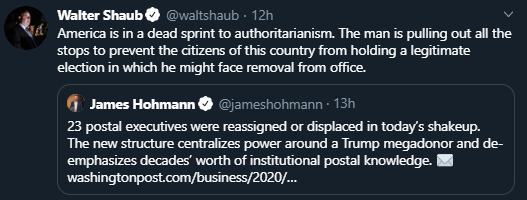
According to Brian Tyler Cohen, a liberal commentator and podcast host, “Congressional Democrats need to do something about this” immediately.
“If we wait until October/November, it’ll be too late,” said Cohen. “Trump is actively sabotaging the election under our noses—this isn’t theoretical, it’s happening RIGHT NOW.” Cohen said this situation should be treated like a “fucking five-alarm fire” and said action must be taken by both lawmakers and the U.S. public without delay.
Rep. Gerald E. Connolly (D-Va.), chair of the House subcommittee which has oversight for the USPS, said what DeJoy is trying to pass off as simple organizational restructuring is actually “a Trojan Horse” designed to destroy one of the nation’s most trusted and valued institutions from within.
Connolly on Friday night called it, “Deliberate sabotage to disrupt mail service on the eve of the election—an election that hinges on mail-in ballots.”
30 notes
·
View notes
Link
via Politics – FiveThirtyEight
In 2018, Democrats took back the House thanks to a blue wave that ran right through America’s suburbs. Now the question is, can they hold onto that majority?
The answer is probably yes, as Democrats are clear favorites, according to the final version of FiveThirtyEight’s House forecast, which gives them a 97 in 100 chance of winning control of the House.1

Overall, the House contest appears to have significantly less drama than either the race for the presidency or the Senate, both of which are far more competitive. Democrats currently control 233 seats to the GOP’s 201 seats,2 with retiring Libertarian Rep. Justin Amash the lone third-party member in the chamber. So to win back the House, Republicans need a net gain of 17 seats to achieve a majority of 218, which is one reason why their odds of taking back the chamber are so low (3 in 100). That’s a lot of House seats in a presidential cycle, as a party has only gained that many twice in the past 10 presidential elections.
But perhaps the even bigger reason why Democrats are favored to keep control of the House — as well as maybe win the White House and even the Senate — is that the electoral environment looks quite good for their party. If we look at the polling average from our congressional generic ballot tracker, which includes all polls that ask respondents whether they plan to vote for the Democrat or Republican in their local congressional race, Democrats lead by 7.3 percentage points. That margin speaks to a strong national environment for Democrats and isn’t that far off from the 8.7-point edge Democrats had heading into the 2018 midterm elections. And as the chart below shows, this lead hasn’t fluctuated much over the past year.

What this has meant practically is that the overall electoral environment has boosted the chances of House Democrats, but most notably it’s given a leg up to those who captured Republican seats in 2018 and are now seeking reelection. Of the 41 Democrats who flipped seats in 2018 — not counting one who resigned and another who switched parties — 30 have at least a 3 in 4 shot of holding onto their seat. This despite the fact that President Trump carried 20 of those 41 seats when he won in 2016. These conditions, along with strong Democratic fundraising and mediocre Republican candidate recruitment in many key races, have left a pretty short list of Democratic incumbents who are in serious danger of defeat, as the table below shows.
Most House Democrats in competitive races have good odds
Democratic House incumbents who are seeking reelection and have less than a 95 percent chance of winning, according to the final numbers from the Deluxe version of FiveThirtyEight’s forecast
District Incumbent Flipped GOP seat in 2018 Chance of winning Rating MN-07 Collin Peterson 19% Likely R OK-05 Kendra Horn ✓ 51 Toss-up NM-02 Xochitl Torres Small ✓ 55 Toss-up UT-04 Ben McAdams ✓ 56 Toss-up CA-21 TJ Cox ✓ 58 Toss-up NY-11 Max Rose ✓ 58 Toss-up SC-01 Joe Cunningham ✓ 64 Lean D CA-48 Harley Rouda ✓ 68 Lean D NV-04 Steven Horsford 72 Lean D NY-22 Anthony Brindisi ✓ 73 Lean D CA-39 Gil Cisneros ✓ 74 Lean D GA-06 Lucy McBath ✓ 74 Lean D TX-07 Lizzie Pannill Fletcher ✓ 75 Lean D NJ-07 Tom Malinowki ✓ 76 Likely D OR-04 Peter DeFazio 78 Likely D VA-07 Abigail Spanberger ✓ 79 Likely D FL-27 Donna Shalala ✓ 81 Likely D FL-26 Debbie Mucarsel-Powell ✓ 82 Likely D NV-03 Susie Lee 83 Likely D NH-01 Chris Pappas 84 Likely D TX-32 Colin Allred ✓ 84 Likely D WI-03 Ron Kind 84 Likely D IA-03 Cindy Axne ✓ 84 Likely D IL-06 Sean Casten ✓ 87 Likely D VA-02 Elaine Luria ✓ 87 Likely D IL-14 Lauren Underwood ✓ 87 Likely D IA-01 Abby Finkenauer ✓ 87 Likely D AZ-01 Tom O’Halleran 88 Likely D PA-17 Conor Lamb ✓ 89 Likely D CA-10 Josh Harder ✓ 92 Likely D PA-08 Matt Cartwright 92 Likely D MI-11 Haley Stevens ✓ 93 Likely D NJ-03 Andy Kim ✓ 93 Likely D MN-02 Angie Craig ✓ 93 Likely D CA-45 Katie Porter ✓ 94 Likely D NC-01 G.K. Butterfield 94 Likely D MI-08 Elissa Slotkin ✓ 94 Likely D NY-19 Antonio Delgado ✓ 94 Likely D
In other words, these seemingly more competitive seats are, for the most part, not necessarily that close, which limits the GOP’s path back to a majority. Nevertheless, a handful of Democratic incumbents are in jeopardy of losing. In fact, the most vulnerable incumbent from either party is Democratic Rep. Collin Peterson of Minnesota, who has about a 1 in 5 chance of winning reelection in a seat that Trump won by 31 points four years ago, according to Daily Kos Elections. Beyond Peterson, five other Democrats fall into the “toss-up” range in our forecast: Reps. Kendra Horn of Oklahoma, TJ Cox of California, Max Rose of New York, Xochitl Torres Small of New Mexico and Ben McAdams of Utah. Of that quintet, Cox is the outlier because he’s the only one running in a seat that is pretty Democratic-leaning at the presidential level — Trump lost it by 16 points in 2016 — whereas the others all hold seats Trump won by at least 7 points. But Cox’s seat is probably one of the better candidate recruitment situations for the GOP, as ex-Rep. David Valadao, who Cox defeated by less than 1 point in 2018, is back for a rematch.
Aside from the strength of their incumbents, Democrats have also benefited from the sheer number of Republican retirements this year. Not to mention, some GOP primary challenges that resulted in some incumbents losing renomination. Although the incumbency advantage is not nearly as strong as it once was, open seats tend to be harder for the incumbent party to retain, and the disproportionate number of Republican exits from the House has left some vulnerable turf for them to defend. As the table below shows, this means Republicans are defending almost all of the 17 open seats where neither party is a safe bet.
Republicans are defending more competitive open seats
Democratic chances of victory in open House seats where the incumbent party has less than a 95 percent chance of winning, according to the final numbers from the Deluxe version of FiveThirtyEight’s forecast
District Incumbent Party Dem. chances Rating NC-02 R 100% Safe D NC-06 R 100 Safe D IA-02 D 88 Likely D TX-23 R 74 Lean D NY-02 R 57 Toss-up IN-05 R 50 Toss-up VA-05 R 49 Toss-up TX-24 R 48 Toss-up MI-03 L 44 Toss-up GA-07 R 43 Toss-up CO-03 R 39 Lean R TX-22 R 32 Lean R NC-11 R 27 Lean R MT-AL R 23 Likely R FL-15 R 19 Likely R KS-02 R 9 Likely R CA-50 R 5 Likely R
While Democrats are only outright favorites in three GOP-held seats, that trio account for half of the six seats that Hillary Clinton carried in 2016 that Republicans still control (GOP incumbents are running in the other three). Two are near-certain Democratic pickups thanks to North Carolina’s court-ordered redistricting, which made those seats much more Democratic-leaning and precipitated the retirements of two Republican incumbents. And Republican Rep. Will Hurd’s retirement in Texas’s 23rd Congressional District, which Trump lost by 3 points in 2016, has given Democratic nominee Gina Ortiz Jones a clear edge there. Additionally, Democrats are roughly even bets to win a number of other open Republican-held districts, including suburban seats like Indiana’s 5th Congressional District around Indianapolis and New York’s 2nd Congressional District on Long Island, both left open by retirements. They also have a shot at winning GOP-controlled seats where the incumbent lost renomination, such as Virginia’s 5th Congressional District and Colorado’s 3rd Congressional District. What’s more, only one Democratic-held open seat — Iowa’s 2nd Congressional District — is at all in play, and the Democrats have nearly a 9 in 10 chance of keeping it.
Lastly, Democrats are also in an enviable position because they stand to defeat some Republican incumbents in competitive contests, too. Whereas only 13 Democratic incumbents seeking reelection have less than a 3 in 4 chance of winning reelection, slightly more Republicans — 14 — are in the same position. Still, the one silver lining for Republicans is that none of their incumbents is a clear underdog, as the table below shows. So most of these races might be a bit of a reach for Democrats hoping to pad their margins.
House Republicans whose seats aren’t “safe”
Republican House incumbents who are seeking reelection and have less than a 95 percent chance of winning, according to the final numbers from the Deluxe version of FiveThirtyEight’s forecast
District Incumbent Chance of winning Rating CA-25 Mike Garcia 45% Toss-up NJ-02 Jeff Van Drew 50 Toss-up PA-10 Scott Perry 52 Toss-up AZ-06 David Schweikert 57 Toss-up OH-01 Steve Chabot 58 Toss-up MN-01 Jim Hagedorn 60 Lean R NE-02 Don Bacon 60 Lean R IL-13 Rodney Davis 63 Lean R NY-24 John Katko 64 Lean R NC-08 Richard Hudson 66 Lean R AR-02 French Hill 66 Lean R MO-02 Ann Wagner 69 Lean R TX-21 Chip Roy 71 Lean R MI-06 Fred Upton 71 Lean R AK-AL Don Young 79 Likely R WA-03 Jaime Herrera Beutler 82 Likely R PA-01 Brian Fitzpatrick 84 Likely R KY-06 Andy Barr 85 Likely R NY-01 Lee Zeldin 86 Likely R TX-25 Roger Williams 89 Likely R NC-09 Dan Bishop 90 Likely R MI-07 Tim Walberg 90 Likely R FL-16 Vern Buchanan 90 Likely R TX-03 Van Tayor 90 Likely R OH-10 Mike Turner 91 Likely R TX-10 Michael McCaul 92 Likely R TX-06 Ron Wright 92 Likely R FL-18 Brian Mast 93 Likely R VA-01 Rob Wittman 93 Likely R CA-42 Ken Calvert 93 Likely R TX-31 John Carter 94 Likely R OH-12 Troy Balderson 94 Likely R MN-08 Pete Stauber 95 Likely R
GOP Rep. Mike Garcia, who won a special election earlier this year to fill a vacancy in California’s 25th Congressional District, heads into the election as the most at-risk Republican incumbent. But along with Garcia are four others in toss-up contests: Reps. Jeff Van Drew of New Jersey, Scott Perry of Pennsylvania, David Schweikert of Arizona and Don Bacon of Nebraska. Van Drew won as a Democrat in 2018 but switched parties after voting against impeaching Trump, probably thinking he’d have an easier time as a Republican in a district that backed Trump by about 5 points in 2016, but the race is super close and he’s been outraised by Democrat Amy Kennedy — yes, part of that Kennedy family. Bacon, meanwhile, is defending a seat that could also matter a great deal in the presidential race because Nebraska apportions one electoral vote to each of its congressional districts, and its 2nd Congressional District is somewhat more likely to vote for Biden than Trump.
Bottom line: Democrats have benefited from an overall Democratic-leaning national environment, in addition to a number of strong Democratic incumbents, a sizable number of competitive Republican-held open seats and some vulnerable GOP officeholders. There’s no fuzziness here in what our forecast says: Democrats are in a very strong position to maintain control of the House. We’ll see how it plays out once the votes are counted, but a Democratic hold would be one of the more unsurprising outcomes in this election.
4 notes
·
View notes
Link
Republicans will cover-up and acquit Trump and his family of their endless violations of the Emoluments Clause of the U.S. Constitution — just as they did in #IMPOTUS Trump’s Impeachment Trial
Because according to the Mitch and Republican Senate, it’s legal for Republicans to commit crimes in the “PUBLIC INTEREST” #LockThemUp
The government agency charged with overseeing federal leases has “no idea” how much money foreign governments or their officials have spent at the Trump International Hotel in Washington, D.C., according to the head of the General Services Administration (GSA).
Testifying before the House Transportation and Infrastructure Committee about the GSA’s oversight of the property, GSA Administrator Emily W. Murphy said she was only aware of what’s been reported in the news.
“The only thing I know is what I’ve read in the paper,” the Trump appointee responded when asked about the amount of money foreign governments have spent at the Old Post Office Building, which is owned by the federal government and leased to the Trump Organization.
“This is a remarkable lack of curiosity on the part of GSA,” a visibly perturbed Rep. Peter DeFazio (D-OR) said in response to Murphy.
“The Trump Organization is violating the law, and the Trump administration is letting them get away with it,” Rep. Dina Titus (D-NV)
“It’s an obvious conflict of interest. The potential transfer of hundreds of millions of dollars into the president’s pocket creates even more legal and ethical issues that the Trump administration is desperate to ignore.”
— Rep. Dina Titustold Yahoo News after the hearing.
“GSA has repeatedly refused to acknowledge the Trump family’s and Trump Organization’s conflicts of interest in maintaining a lease at the Old Post Office building.”, Jennifer Ahearn, the policy director for Citizens for Responsibility and Ethics in Washington (CREW)
19 notes
·
View notes
Text
H.R.6414 To amend title 23, United States Code, to extend the deadline for promulgation of regulations under the tribal transportation self-governance program.
H.R.6414, sponsored by Rep. Peter A. DeFazio, became law on August 14th, 2018.
https://ift.tt/2JUzsek
0 notes